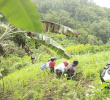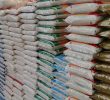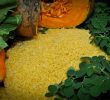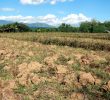
COFFEE DRINKERS. Filipinos are one of the world’s heaviest coffee drinkers, and their country’s annual national coffee production could not keep up. (Mick Basa / davaotoday.com)
DAVAO CITY, Philippines — Filipinos’ love for caffeine is too much for coffee growers to handle, which is why the country imports beans to keep up with the drinking habit.
The Philippine Coffee Board, Inc. (PCBI) on Tuesday, October 24, said Filipinos consumed 150,000 metric tons (MT) of coffee this year, but only produces a maximum of 35,000 metric tons (MT) of green coffee beans (GCB).
Joel Lumagbas, director of PCBI, said the country would have to import coffee mainly from Vietnam and Indonesia to fill the gap.
“Hopefully, we’ll be able to go more than 35,000 but it takes a lot of effort. We are hoping that a lot of farmers will continue to expand their areas,” Lumagbas said.
Mindanao is where the coffee industry could expand, Lumagbas said, adding that Mindanao still contributes largely in coffee production.
“65 to 75 percent comes from Mindanao and only small portion comes from Luzon because of the dwindling area of coffee in Cavite and Batangas.
In Cavite province, for example, where vast coffee farms are found, the PCBI noted that the production has decreased from 1.2 MT to 700 kilos.
The PCBI gathered various stakeholders of the coffee industry during its 10th National Coffee Summit on Wednesday at the SMX Convention Center in Lanang here in a bid to boost the coffee industry.
The industry, they said, is vital to boost Mindanao’s economy.
But although Mindanao hosts vast coffee farms in Sultan Kudarat, Bukidnon, Davao provinces, Cotabato, Surigao and Sulu, the production remains sluggish.
The main culprit? Lumagbas said the expansion of cash crops in in Mindanao has resulted to the cutting down of coffee trees.
“Our number one problem in Mindanao that caused the decline in the production of coffee, the number one culprit is the big plantations,” he said.
He said coffee trees were replaced with pineapple, banana, and palm oil.
Lumagbas added that since coffee farmers are poor, they remain victims of plantations. Farmers he said agree to have their lots rented for five or 10 years “because they are so cash-strapped.”
“They grab it not realizing that they lose the opportunity of earning more income from their coffee trees if they maintain it and if they manage their coffee farms properly,” he said.
Coffee-drinkers
Dr. Dave D’ Haeze, regional manager for Asia-Pacific of the Harris R. Neumann Stiftung said the Philippines annually is importing USD151 million-worth of coffee.
“Last year there was more imports with up to USD500 million,” he said.
According to D’ Haeze, Filipinos have spent a total of USD 4 billion to buy coffee from 1990 to 2016.
But if Filipino coffee producers cannot compete with the amount of yield compared with their neighbors in Asia, Lumagbas said farmers may focus their effort on producing quality coffee.
He said farmers can break into the market of specialty coffee which is “growing 10 percent yearly.”
“Talk about commodity coffee robust, there’s no way we can compete. We will always be at the mercy of big coffee producing countries,” he said.
Lumagbas added: “We might as well focus on adding value to what we can produce.” He also encouraged farmers to focus more on production of specialty coffee, organic coffee because that’s where the price is.
Aside from the lack of areas, Lumagbas also hoped the government can help farmers rejuvenate “senile” coffee trees.
“We have a number of hectares of close to senile. We need to rejuvenate to bring back these coffee to its prime potential,” he said.
According to the Selected Statistics on Agriculture published in 2016 by the Philippine Statistics Authority, the country’s major export commodities were coconut oil with 23 percent contribution to the total value of agricultural exports and fresh banana with 13 percent.
Meanwhile, its record of the volume of coffee production from 2011 to 2015 has been dwindling with 88,500 MT in 2011 to only 72,300 MT in 2015.
But Pacita “Chit” Juan, President of PCBI said the statistics from the Bureau of Agricultural Statistics counts even the cherries, the PCBI meanwhile, only counts the GCB.
While the problem remains at the big hand of the government who allows the plantations to thrive, Juan said to provide help for small coffee farmers, the PCBI provides technical training to produce and grow quality coffee.
“If we cannot achieve the yield, we teach quality,” she said. (davaotoday.com)










